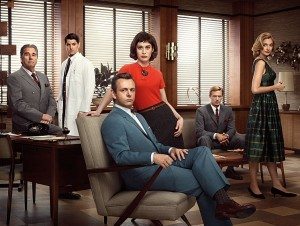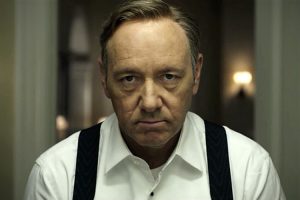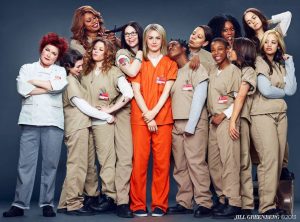
Network channels like ABC and NBC used to hold a monopoly on the best television shows, with popular hits on cable a rarity. All that has changed over the past half-decade, with cable or subscription channels like AMC and HBO dominating the television landscape. Sure, most cable shows earn lower ratings than network, though even that isn't always true: AMC's "The Walking Dead" is the highest-rated scripted show on television. But what they sometimes lack in viewers, they more than make for in rabid cult fanbases, rave critical reviews, and mountains of Emmys. And the tide is still turning... Now Netflix has entered the race, forcing networks even further into the shadows. It's no surprise that nine of the ten spots on this list are taken up by shows from cable, subscription channels, and Netflix. But which network show shockingly surpassed them all to nab the top prize?
 Showtime lost its most popular show when "Dexter" signed off the air in September, but the subscriber channel already has its next hit. Don't be fooled by its title. "Masters Of Sex" is a slick, stylish and surprisingly subtle period piece that chronicles the efforts of William Masters and his assistant Virginia Johnson to spearhead the sexual revolution by pioneering controversial experiments. Michael Sheen ("Frost/Nixon") is excellent as Masters, but it's Lizzy Caplan ("True Blood") who steals the show as the feisty Virginia. Bolstered by legendary supporting players (like Beau Bridges and Allison Janney) and meticulous attention to period detail, "Masters" is a fascinating character study...that also happens to contain see-through dildos (for science, of course).
Showtime lost its most popular show when "Dexter" signed off the air in September, but the subscriber channel already has its next hit. Don't be fooled by its title. "Masters Of Sex" is a slick, stylish and surprisingly subtle period piece that chronicles the efforts of William Masters and his assistant Virginia Johnson to spearhead the sexual revolution by pioneering controversial experiments. Michael Sheen ("Frost/Nixon") is excellent as Masters, but it's Lizzy Caplan ("True Blood") who steals the show as the feisty Virginia. Bolstered by legendary supporting players (like Beau Bridges and Allison Janney) and meticulous attention to period detail, "Masters" is a fascinating character study...that also happens to contain see-through dildos (for science, of course).
 It's no secret that America is in the throes of a full-on zombie obsession. From "The Walking Dead" to "World War Z," we can't get enough of those brain-eating freaks. So it would take something fresh and daring to break through the glut of undead entertainment and catch audiences' attention. France managed to do just that with their drama "The Returned." Airing in the U.S. on the Sundance Channel, the show is technically about zombies, although it's less "Dawn Of The Dead" and more "Twin Peaks." Several years after a tragic bus crash in a small mountain town, the victims start coming back to life. But these aren't rotting, shuffling monsters -- they're living, breathing people who haven't aged a day since the accident and have no memory of dying. Permeated to its core by a foreboding atmosphere of dread, "The Returned" combines the supernatural with oppressive reality into a unique blend of genres. In case this sounds too depressing, don't worry -- one of The Returned is a serial killer who wastes no time in continuing to claim victims. A combination of intense character study and heart-pounding mystery, "The Returned" is unlike anything on American television and unlike any zombie tale you've seen before.
It's no secret that America is in the throes of a full-on zombie obsession. From "The Walking Dead" to "World War Z," we can't get enough of those brain-eating freaks. So it would take something fresh and daring to break through the glut of undead entertainment and catch audiences' attention. France managed to do just that with their drama "The Returned." Airing in the U.S. on the Sundance Channel, the show is technically about zombies, although it's less "Dawn Of The Dead" and more "Twin Peaks." Several years after a tragic bus crash in a small mountain town, the victims start coming back to life. But these aren't rotting, shuffling monsters -- they're living, breathing people who haven't aged a day since the accident and have no memory of dying. Permeated to its core by a foreboding atmosphere of dread, "The Returned" combines the supernatural with oppressive reality into a unique blend of genres. In case this sounds too depressing, don't worry -- one of The Returned is a serial killer who wastes no time in continuing to claim victims. A combination of intense character study and heart-pounding mystery, "The Returned" is unlike anything on American television and unlike any zombie tale you've seen before.
 "The Fall" isn't a Netflix original program like some later entries, but Netflix is the only place American audiences can watch this stellar British/Irish import. Starring Gillian Anderson ("The X-Files") as a detective investigating a series of murders in Belfast, this crime drama surpasses all the pitfalls of its well-trod genre to deliver a gripping story that plays out less like a string of episodes and more like one long film. What makes "The Fall" so unique is the strength of its central theme: namely, intimacy. Intimacy between lovers, between exes, parents and their children, a detective and the murderer she's investigating, and -- most unsettlingly -- between a murderer and his prey. Scenes of the madman, played by Jamie Dornan (who will next be seen as the lead in "50 Shades Of Grey"), killing and tending to the bodies of his victims are shot with a surprisingly gentle touch that allow the viewer easy access into his troubled mind. In his own twisted way, he just wants to be close to someone -- a feeling we can all identify with. Add in a top-notch performance by Anderson and some gorgeous cinematography, and you have the makings of a must-watch hit.
"The Fall" isn't a Netflix original program like some later entries, but Netflix is the only place American audiences can watch this stellar British/Irish import. Starring Gillian Anderson ("The X-Files") as a detective investigating a series of murders in Belfast, this crime drama surpasses all the pitfalls of its well-trod genre to deliver a gripping story that plays out less like a string of episodes and more like one long film. What makes "The Fall" so unique is the strength of its central theme: namely, intimacy. Intimacy between lovers, between exes, parents and their children, a detective and the murderer she's investigating, and -- most unsettlingly -- between a murderer and his prey. Scenes of the madman, played by Jamie Dornan (who will next be seen as the lead in "50 Shades Of Grey"), killing and tending to the bodies of his victims are shot with a surprisingly gentle touch that allow the viewer easy access into his troubled mind. In his own twisted way, he just wants to be close to someone -- a feeling we can all identify with. Add in a top-notch performance by Anderson and some gorgeous cinematography, and you have the makings of a must-watch hit.
 Another foreign entry, "Please Like Me" is a comedy/drama from Australia that aired in the U.S. on Pivot. If you've never heard of/don't get Pivot, don't worry -- you can download all six episodes of the first season from Amazon. And you should. Perhaps the easiest way to describe the tone of "Please Like Me" is if HBO's "Girls" featured an awkward gay Australian boy instead of Lena Dunham. Written by and starring Josh Thomas, "Please Like Me" is the story of a group of twentysomethings who are still figuring themselves out, fumbling through relationships, and trying to find their place in the world. In the first scene of the pilot, Josh is dumped by his girlfriend. "You're probably gay," she explains calmly. And it's all downhill for Josh from there. Containing a cast with impeccable comedic timing, filled with fast-paced naturalistic dialogue, and mining comedy from painful events like coming out and attempted suicide, "Please Like Me" is a charmingly self-deprecating and wholly relatable show full of both joy and pathos.
Another foreign entry, "Please Like Me" is a comedy/drama from Australia that aired in the U.S. on Pivot. If you've never heard of/don't get Pivot, don't worry -- you can download all six episodes of the first season from Amazon. And you should. Perhaps the easiest way to describe the tone of "Please Like Me" is if HBO's "Girls" featured an awkward gay Australian boy instead of Lena Dunham. Written by and starring Josh Thomas, "Please Like Me" is the story of a group of twentysomethings who are still figuring themselves out, fumbling through relationships, and trying to find their place in the world. In the first scene of the pilot, Josh is dumped by his girlfriend. "You're probably gay," she explains calmly. And it's all downhill for Josh from there. Containing a cast with impeccable comedic timing, filled with fast-paced naturalistic dialogue, and mining comedy from painful events like coming out and attempted suicide, "Please Like Me" is a charmingly self-deprecating and wholly relatable show full of both joy and pathos.
 "Dexter" may be off the air, but our country's fascination with serial killers hasn't gone anywhere. A&E, a channel mostly known for reality programming like "Duck Dynasty" and "Storage Wars" got into the creepy-murderer game with this dark modern-day prequel to "Psycho." "Bates Motel" stars Freddie Highmore ("Finding Neverland") as Norman Bates, the budding sociopath who will grow up to one day cross-dress and stab people in their showers. Highmore's Norman is terrific as a conflicted boy attempting to move past his emotional shortcomings to connect with the outside world. But it's Vera Farmiga ("The Conjuring") as his mother Norma who really owns the show. She delivers a performance of unhinged perfection...but she's no monster. Yes, she's overly attached to her son, and maybe she's emotionally crippling him, but she's doing the best she can under awful circumstances. It's the power of Farmiga's portrayal that Mrs. Bates earns more sympathy than disgust, even as she continues to turn an innocent boy into the beast we all know he will become.
"Dexter" may be off the air, but our country's fascination with serial killers hasn't gone anywhere. A&E, a channel mostly known for reality programming like "Duck Dynasty" and "Storage Wars" got into the creepy-murderer game with this dark modern-day prequel to "Psycho." "Bates Motel" stars Freddie Highmore ("Finding Neverland") as Norman Bates, the budding sociopath who will grow up to one day cross-dress and stab people in their showers. Highmore's Norman is terrific as a conflicted boy attempting to move past his emotional shortcomings to connect with the outside world. But it's Vera Farmiga ("The Conjuring") as his mother Norma who really owns the show. She delivers a performance of unhinged perfection...but she's no monster. Yes, she's overly attached to her son, and maybe she's emotionally crippling him, but she's doing the best she can under awful circumstances. It's the power of Farmiga's portrayal that Mrs. Bates earns more sympathy than disgust, even as she continues to turn an innocent boy into the beast we all know he will become.
 Some viewers were turned off by Kevin Spacey's fourth-wall-breaking monologues, but the majority of Netflix subscribers were hooked by the Machiavellian manipulations of Representative Frank Underwood and his Lady Macbeth-ian wife, Claire. (And in fact, those soliloquies fit perfectly inside the Shakespearean drama the megalomaniacal Frank imagines himself the hero of.) Kevin Spacey chews the scenery with gusto while surrounded by a stellar supporting cast including Robin Wright as Claire, Kate Mara ("American Horror Story") as a prying reporter, and Corey Stoll ("Midnight In Paris") as a sadsack victim of Frank's devious plots. Only the second original programming in Netflix's history (after "Lilyhammer"), "House Of Cards" is what put the streaming service on the map of quality dramas. The show made history when it became the first non-televised series to be eligible for Emmy consideration. (It was nominated for nine awards, including Outstanding Drama Series, and took home three statues.) When Netflix released all thirteen episodes at once, the show helped cement the phenomenon of "binge-watching" as an acceptable form of entertainment consumption, for better or for worse.
Some viewers were turned off by Kevin Spacey's fourth-wall-breaking monologues, but the majority of Netflix subscribers were hooked by the Machiavellian manipulations of Representative Frank Underwood and his Lady Macbeth-ian wife, Claire. (And in fact, those soliloquies fit perfectly inside the Shakespearean drama the megalomaniacal Frank imagines himself the hero of.) Kevin Spacey chews the scenery with gusto while surrounded by a stellar supporting cast including Robin Wright as Claire, Kate Mara ("American Horror Story") as a prying reporter, and Corey Stoll ("Midnight In Paris") as a sadsack victim of Frank's devious plots. Only the second original programming in Netflix's history (after "Lilyhammer"), "House Of Cards" is what put the streaming service on the map of quality dramas. The show made history when it became the first non-televised series to be eligible for Emmy consideration. (It was nominated for nine awards, including Outstanding Drama Series, and took home three statues.) When Netflix released all thirteen episodes at once, the show helped cement the phenomenon of "binge-watching" as an acceptable form of entertainment consumption, for better or for worse.
 Stephen Merchant may not be as famous in the U.S. as his co-creator of the original U.K. "The Office", Ricky Gervais -- but that should soon change thanks to this stellar HBO comedy. Written, directed by, and starring Merchant as bumbling wannabe-lothario Stuart, "Hello Ladies" is the type of comedy that will have you cringing as often as laughing. You may have a hard time watching as Stuart fumbles his way through one awkward romantic encounter after another. But at the heart of "Hello Ladies" is Stuart's relationship with his tenant, Jessica, played by Christine Woods ("FlashForward"). A lesser show would have made Jessica a lucky-in-love foil to Stuart; what makes this comedy so refreshing is that in her own way, Jessica is as romantically incapable as her landlord. Watching these two fail time and again is often uncomfortable but always hilarious. But it's seeing them lean on each other after each bungled encounter that keeps the show grounded and prevents "Hello Ladies" from verging into too-painful-to-watch territory.
Stephen Merchant may not be as famous in the U.S. as his co-creator of the original U.K. "The Office", Ricky Gervais -- but that should soon change thanks to this stellar HBO comedy. Written, directed by, and starring Merchant as bumbling wannabe-lothario Stuart, "Hello Ladies" is the type of comedy that will have you cringing as often as laughing. You may have a hard time watching as Stuart fumbles his way through one awkward romantic encounter after another. But at the heart of "Hello Ladies" is Stuart's relationship with his tenant, Jessica, played by Christine Woods ("FlashForward"). A lesser show would have made Jessica a lucky-in-love foil to Stuart; what makes this comedy so refreshing is that in her own way, Jessica is as romantically incapable as her landlord. Watching these two fail time and again is often uncomfortable but always hilarious. But it's seeing them lean on each other after each bungled encounter that keeps the show grounded and prevents "Hello Ladies" from verging into too-painful-to-watch territory.
 The women who populate this Canadian show, from Sarah the con artist to Alison the soccer mom, from Cosima the lesbian biologist to Helena the crazed assassin, are all intriguing and brilliantly portrayed. The fact that they all happen to be played by the same actress is a feat beyond imagining. In this sci-fi thriller of clones and shady government conspiracies, the stunningly talented Tatiana Maslany plays not one, not two, but seven different characters in the first season alone. They may all look identical, but her performances are so varied and so specific that it's easy to forget they're all coming from the same person. In one mind-bending scene, Maslany must play Alison pretending to be Sarah (who's currently pretending to be Beth, yet another clone), and Maslany keeps track of each distinct layer to perfection. In another memorable episode, Alison and Sarah continually exchange places while hosting a neighborhood potluck upstairs and torturing someone downstairs, in a sequence that could be straight out of a Shakespearean farce...if it weren't so nail-bitingly intense. It's a veritable master class in acting that just happens to be contained in a nonstop thrill ride of a show.
The women who populate this Canadian show, from Sarah the con artist to Alison the soccer mom, from Cosima the lesbian biologist to Helena the crazed assassin, are all intriguing and brilliantly portrayed. The fact that they all happen to be played by the same actress is a feat beyond imagining. In this sci-fi thriller of clones and shady government conspiracies, the stunningly talented Tatiana Maslany plays not one, not two, but seven different characters in the first season alone. They may all look identical, but her performances are so varied and so specific that it's easy to forget they're all coming from the same person. In one mind-bending scene, Maslany must play Alison pretending to be Sarah (who's currently pretending to be Beth, yet another clone), and Maslany keeps track of each distinct layer to perfection. In another memorable episode, Alison and Sarah continually exchange places while hosting a neighborhood potluck upstairs and torturing someone downstairs, in a sequence that could be straight out of a Shakespearean farce...if it weren't so nail-bitingly intense. It's a veritable master class in acting that just happens to be contained in a nonstop thrill ride of a show.
 Netflix's second original drama of 2013 was even better than the first. From creator Jenji Kohan ("Weeds"), the series is based on the memoirs of Piper Kerman, who landed in prison after being busted for muling money for her drug smuggler girlfriend ten years earlier. In one of the most audacious bait-and-switches in recent television memory, "Orange" drew viewers in by introducing them to prison through the eyes of an inoffensive, pretty, middle-class white woman...and then promptly relegated Piper to ensemble player, and devoted equal time to the lives of the women of varying backgrounds, nationalities, and sexualities who surround her. Each episode contains flashbacks to one inmate's past, chronicling the events that landed them to prison, allowing us to understand and empathize with the circumstances and struggles that led these women to this point in their lives. Miss Claudette. Red. Pennsatucky. Taystee. Crazy Eyes. Sophia. Yoga Jones. Never before has one single show featured so many well-drawn female characters. It's sad that in 2013, that's still an achievement to be noted, but it's true. Whether inspiring laughter or tears with its blend of black humor and poignancy, "Orange Is The New Black" is always authentic, and always engrossing.
Netflix's second original drama of 2013 was even better than the first. From creator Jenji Kohan ("Weeds"), the series is based on the memoirs of Piper Kerman, who landed in prison after being busted for muling money for her drug smuggler girlfriend ten years earlier. In one of the most audacious bait-and-switches in recent television memory, "Orange" drew viewers in by introducing them to prison through the eyes of an inoffensive, pretty, middle-class white woman...and then promptly relegated Piper to ensemble player, and devoted equal time to the lives of the women of varying backgrounds, nationalities, and sexualities who surround her. Each episode contains flashbacks to one inmate's past, chronicling the events that landed them to prison, allowing us to understand and empathize with the circumstances and struggles that led these women to this point in their lives. Miss Claudette. Red. Pennsatucky. Taystee. Crazy Eyes. Sophia. Yoga Jones. Never before has one single show featured so many well-drawn female characters. It's sad that in 2013, that's still an achievement to be noted, but it's true. Whether inspiring laughter or tears with its blend of black humor and poignancy, "Orange Is The New Black" is always authentic, and always engrossing.
 The idea of anyone other than Anthony Hopkins playing notorious serial killer Hannibal Lecter verges on blasphemy. And yet, in this new drama from creator Bryan Fuller ("Pushing Daisies," "Dead Like Me"), Danish actor Mads Mikkelsen ("Casino Royale") steps into the cannibal's shoes with ease, erasing any comparisons to the incomparable Hopkins by crafting his own take on the beloved villain. Based on characters from the Thomas Harris novels, this series takes place in the time leading up to the events of "Red Dragon" and chronicles the foundation of Lecter's relationship with FBI profiler Will Graham. As the brilliant but troubled Graham, Hugh Dancy ("The Big C") delivers an unbalanced and unpredictable performance that, as the series goes on, spirals ever nearer to madness. Cursed with the gift of true empathy, Graham can solve murders by placing himself fully in the killer's mind. But the more he does this, the closer he gets to becoming a psychopath himself. Watching Hannibal toy with Graham, pushing him dangerously close to the brink, is sheer agony -- and makes for delicious drama. Speaking of delicious..."Hannibal" is hands down the most gorgeously gruesome show on television. From the artistic dinners that Hannibal prepares to the bloody murders that Graham investigates, every single shot is an eye-popping work of art. Corpses that have become mushroom farms; men that have been mutilated into grotesque angels; bodies that have been stacked into giant totem poles -- never before has murder looked so beautiful. Separating itself from its lesser cousins ("The Following," "Dexter" in its later seasons), "Hannibal" doesn't use its violence merely for shock value or to grab headlines. It's all in service of the story: a smartly disturbing rumination on the nature of evil and the toll exacted on those dedicated to vanquishing it.
The idea of anyone other than Anthony Hopkins playing notorious serial killer Hannibal Lecter verges on blasphemy. And yet, in this new drama from creator Bryan Fuller ("Pushing Daisies," "Dead Like Me"), Danish actor Mads Mikkelsen ("Casino Royale") steps into the cannibal's shoes with ease, erasing any comparisons to the incomparable Hopkins by crafting his own take on the beloved villain. Based on characters from the Thomas Harris novels, this series takes place in the time leading up to the events of "Red Dragon" and chronicles the foundation of Lecter's relationship with FBI profiler Will Graham. As the brilliant but troubled Graham, Hugh Dancy ("The Big C") delivers an unbalanced and unpredictable performance that, as the series goes on, spirals ever nearer to madness. Cursed with the gift of true empathy, Graham can solve murders by placing himself fully in the killer's mind. But the more he does this, the closer he gets to becoming a psychopath himself. Watching Hannibal toy with Graham, pushing him dangerously close to the brink, is sheer agony -- and makes for delicious drama. Speaking of delicious..."Hannibal" is hands down the most gorgeously gruesome show on television. From the artistic dinners that Hannibal prepares to the bloody murders that Graham investigates, every single shot is an eye-popping work of art. Corpses that have become mushroom farms; men that have been mutilated into grotesque angels; bodies that have been stacked into giant totem poles -- never before has murder looked so beautiful. Separating itself from its lesser cousins ("The Following," "Dexter" in its later seasons), "Hannibal" doesn't use its violence merely for shock value or to grab headlines. It's all in service of the story: a smartly disturbing rumination on the nature of evil and the toll exacted on those dedicated to vanquishing it.